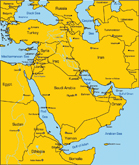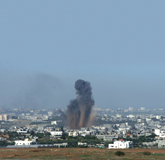

| Photo by Isranet |
In February, the Israel Defense Forces (IDF) began the long-anticipated distribution of gas masks to all of Israel’s residents, according to a report on the IDF Web site. Though masks have been distributed before—most notably in conjunction with the First Gulf War in 1991 when Saddam Hussein fired Scud missiles at Israel—the masks have needed to be upgraded.
Continue Reading »
{image_1}
In January, the Israel Defense Forces [IDF] Medical Corps held a drill to simulate a mass casualty biological weapons attack in the Tel Aviv metropolitan area.

{image_1}
Members of the United Nations peacekeeping force in southern Lebanon report finding a number of bombs planted near the border with the Israeli town of Metula. Described as sophisticated and well made, the weapons each contained about 660 pounds [272 kilograms] of explosives and are believed to have been set to kill Israeli soldiers entering Lebanese territory, presumably in pursuit of cross-border raiders from Hizbullah.

{image_1}
Israel will maintain a strong military presence along the eastern border of the Palestinian state—its border with Jordan—once it’s created, according to Israeli Prime Minister Benjamin Netanyahu. He told foreign reporters in Jerusalem that “the ability to proliferate into contiguous areas thousands of rockets and missiles” creates a “monumental security problem.”

{image_1}BEFORE THE DUST SETTLES from Israel's attacks on Iran's nuclear facilities, the Islamic Republic will send its ballistic missiles into the very heart of Tel Aviv. This was spelled out by a deputy of Supreme Leader Ayatollah Ali Khamenei's representative in the Revolutionary Guards, Mojtaba Zolnour.
Continue Reading »
{image_1}TURKEY, which has recently made political maneuverings to mediate future peace talks between Israel and Syria, warned of dire consequences for Israel if it used Turkish air space against Iran. Turkish Prime Minister Recep Tayyip Erdogan said that Turkey would respond harshly if Israel were to infiltrate its air space in an attempt to spy on Iran..
Continue Reading »
{image_1} ISRAEL BLASTED THE UNITED NATIONS fact-finding mission report, also known as the Goldstone Report—on Israel’s Operation Cast Lead campaign in the Gaza Strip—which declared Israel and Hamas both guilty of actions that amount to war crimes. The Ministry of Foreign Affairs Web site said that the report “effectively ignores Israel's right of self defense, makes unsubstantiated claims about its intent, and challenges Israel's democratic values and rule of law.”
Continue Reading »
{image_1}THE EVER EVOLVING DEVELOPMENTS of Iran’s nuclear program—with weekly, if not daily, new reports—are keeping the world on its toes wondering what’s coming next. The Media Line reported that, on September 23, Iran’s nuclear head said that a “new generation” of centrifuges had been constructed, which were “stronger and faster” and were being tested.
Continue Reading »
{image_1}Seventy-one US Senators sent a letter to US President Barack Obama asking him to encourage and pressure Arab states to consider “dramatic gestures” toward Israel in order to show their commitment to peace with the Jewish state. In their letter, the senators—Democrats and Republicans—detailed steps taken by Prime Minister Benjamin Netanyahu in order to signal Israel’s commitment for peace with the Palestinians and the entire Arab world.
Continue Reading »
{image_1}
The sight of a man and his dog sleeping outside a fashion shop on Ben Yehuda Street is one more manifestation of the fact that in Jerusalem the economic situation is about twice as bad as in the rest of the country. The few coins by his right hand tell little about this man as an individual. Begging in Jerusalem has always been part of the city’s life, but it does not tell the entire story. There are fewer jobs in Jerusalem than in the rest of the country. Poverty in Israel’s largest city has increased very dramatically in the past eight years. Although there are many different criteria for measuring poverty, there has been about a 40% increase in the numbers of Jerusalemites who are regarded as being below the official poverty threshold. In 2006, the average monthly income for a worker in Jerusalem was half as much as a similar worker in Tel Aviv.
All logos and trademarks in this site are property of their respective owner. All other materials are property of Bridges for Peace. Copyright © 2025.
Website Site Design by J-Town Internet Services Ltd. - Based in Jerusalem and Serving the World.